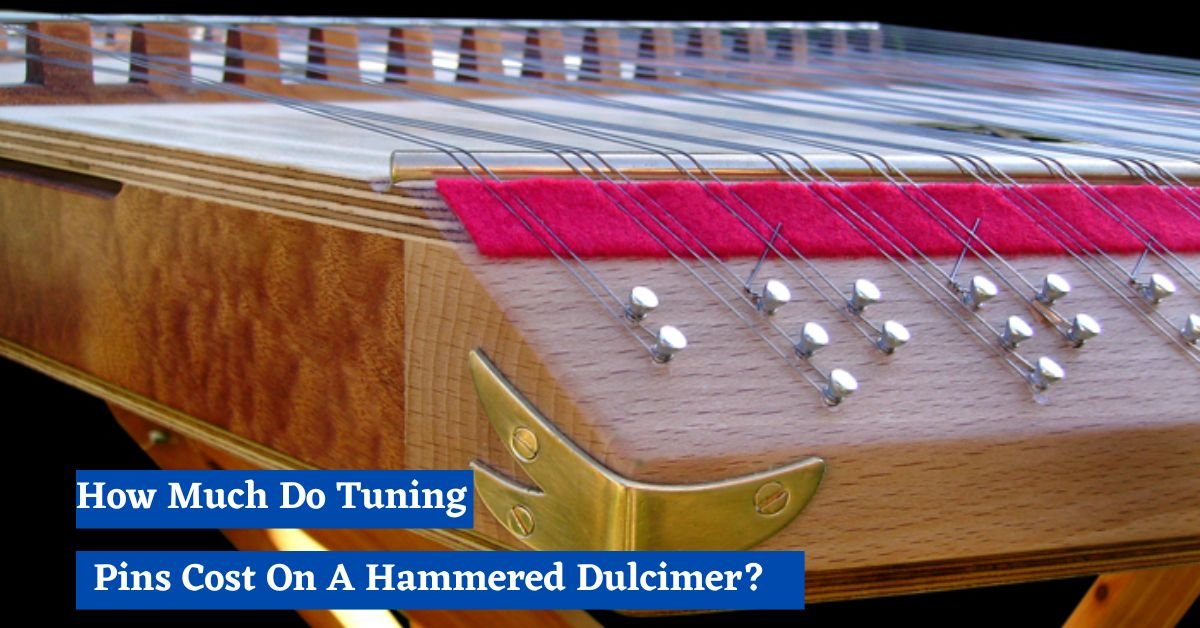Physical Address
304 North Cardinal St.
Dorchester Center, MA 02124
Physical Address
304 North Cardinal St.
Dorchester Center, MA 02124


How Much Do Tuning Pins Cost On A Hammered Dulcimer: The cost of tuning pins for a hammered dulcimer typically ranges from $5 to $15 per pin, depending on the material and quality.
Tuning pins are small yet indispensable components of a hammered dulcimer. They are essential for ensuring that the strings are correctly tensioned, which directly impacts the pitch and sound quality of the instrument. When the tuning pins are well-maintained and properly set, the dulcimer produces a harmonious and resonant tone. However, if they are loose, worn out, or damaged, the instrument may sound off-key or produce an undesirable buzz. Regular maintenance and occasional replacement of tuning pins are crucial to keep the hammered dulcimer sounding its best.

The cost of tuning pins for a hammered dulcimer can vary based on several factors:
There are two main types of tuning pins used in hammered dulcimers
Tuning pins, also known as hitch pins, are typically made of high-quality steel, brass, or nickel-plated steel. These materials offer excellent durability and resistance to wear, ensuring that the pins can withstand the tension exerted by the strings and maintain stable tuning over extended periods.

The choice of material can influence the cost and longevity of the tuning pins, with steel being the most common option due to its favorable balance of strength and affordability. Brass and nickel-plated steel, on the other hand, are preferred for their corrosion resistance and appealing aesthetics.
Piano tuning pegs, also referred to as wrest pins or tuning pins, are primarily constructed from high-carbon steel. High-carbon steel possesses the necessary strength and hardness to endure the immense tension of piano strings and allows for precise tuning adjustments.
The steel’s composition ensures that the tuning pegs remain stable in their respective pinblocks while enduring the rigorous process of tuning without slipping or losing pitch. The use of high-quality steel is imperative to maintain the piano’s tuning stability and overall performance.
Piano tuning pins are typically made of high-carbon steel. High-carbon steel, also known as spring steel, contains a higher percentage of carbon than regular steel. This increased carbon content provides exceptional tensile strength and hardness, making it well-suited for withstanding the immense pressure exerted by piano strings during tuning.

The hardness of high-carbon steel also helps prevent the tuning pins from wearing out quickly and ensures that they maintain their integrity over time, allowing pianos to hold their tune effectively and provide a reliable and consistent musical experience.
While piano tuning pins generally follow standardized sizes, there can be slight variations depending on the piano manufacturer and model. Most modern pianos, including grand and upright pianos, utilize tuning pins of uniform dimensions. The most common size for piano tuning pins is approximately 2.5 inches in length with a diameter of about 0.25 inches.
However, historical or antique pianos might have different sizing due to varying manufacturing practices. It is crucial for piano technicians to have a range of tuning pin sizes and tools to accommodate different pianos’ unique requirements during tuning and maintenance procedures.
Can I replace tuning pins on my hammered dulcimer myself?
While it is possible to replace tuning pins yourself, it requires some experience and knowledge of dulcimer construction. If you are not confident in your skills, it is advisable to seek assistance from a professional instrument technician.
How often should I replace tuning pins?
The frequency of tuning pin replacement depends on factors such as the material of the pins, the climate in which the dulcimer is stored, and how frequently the instrument is played. High-quality brass or steel pins can last for many years, while cheaper materials may wear out sooner.
My dulcimer’s tuning is unstable. Do I need new tuning pins?
Unstable tuning can be caused by various factors, including worn-out tuning pins, loose bridges, or changes in humidity. Before replacing the tuning pins, it’s best to have a professional inspect the instrument to identify the root cause of the problem.
Can I upgrade my dulcimer’s tuning pins to improve its sound?
Yes, upgrading to higher-quality tuning pins can enhance the stability of tuning and potentially improve the overall sound quality of the dulcimer.
Are there any maintenance tips to prolong the life of tuning pins?
Regularly cleaning the tuning pins and the pin block, avoiding extreme temperature and humidity changes, and handling the instrument with care can help extend the life of the tuning pins.
Tuning pins are a vital component of a hammered dulcimer, and their proper maintenance is essential for achieving the best sound quality and tuning stability. The cost of tuning pins can vary based on factors such as material, quality, and brand, but investing in higher-quality pins can be worthwhile in the long run. Whether you’re a seasoned dulcimer player or a beginner, understanding the significance of tuning pins and their proper care will ensure that your hammered dulcimer continues to enchant audiences for years to come.